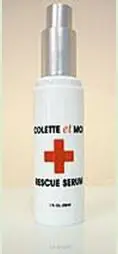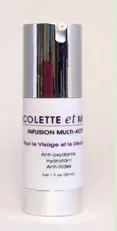ENJOY YOUR COFFEE & DECREASE YOUR RISK OF SKIN CANCER
Recent studies strongly suggest that caffeine decreases one's risk for developing non-melanoma skin cancers. Caffeine acts as a sunscreen absorbing UV light when applied topically to skin. Caffeine inhibits an enzyme known as ATR, which is responsible for monitoring DNA replication in cells and making sure that all DNA has been completely replicated prior to cell division. Caffeine causes atypical skin cells to be eliminated.

Mice studies show that lack of ATR enzyme function decreases development of UV induced skin cancers. Mice exposed to ultraviolet radiation and then given caffeine enriched water to drink did not develop skin cancers. When the caffeine was removed from their diet, they developed non melanoma skin cancers.
Over one's lifetime, 1 cup of coffee (caffeinated) decreases the risk of a non-melanoma skin cancer by up to 5% according to a study of 93,676 women done by Rutgers University in New Jersey. Although the effects of drinking coffee on preventing skin cancer are too small to make this a useful strategy medically, topical caffeine may achieve higher concentrations in the skin than what is possible by normal consumption and be of benefit in reducing non melanoma skin cancers.
In any case, from a dermatological perspective, you should take comfort in knowing that you are doing something good for your skin when you have your morning cup of coffee. Coffee contains polyphenols (caffeic acid and coumaric acid) which are naturally occurring plant products with anti-inflammatory, immunomodulatory, and antioxidant properties.

RESCUE SERUM CONTAINS CONCENTRATIONS OF CAFFEINE AND GREEN TEA POLYPHENOLS.
Dr. Wong recommends applying it underneath your sunscreen to provide additional UV protection and as a defense against potential skin cancer. Rescue serum contains antioxidants that have anti-inflammatory properties, which can help calm rosacea, and repair sunburns and sun damaged skin.
It is available in our office.
GREEN TEA contains epigallocatechin gallate. This polyphenol has been shown to assist in the repair of ultraviolet radiation damage to DNA in skin cells in mice. It also inhibits enzymes involved in tumor growth and may play an important role in carcinogenesis prevention.

Taking VITAMIN D & CALCIUM together may decrease the risk of developing melanoma by 50% in postmenopausal women with a history of having non-melanoma skin cancer, according to Stanford University research. 36,262 postmenopausal women ages 50-79 were randomly selected to take calcium plus Vitamin D supplements or placebo. After 7 years of follow-up, women taking the supplements who had had a previous non-melanoma skin cancer reduced their risk of developing melanoma by 57% compared with similar women taking placebo. The melanoma risk reduction was not observed in women who had no prior history of a non-melanoma skin cancer.
VITAMIN A SUPPLEMENTS may decrease risk of melanoma.
FLAVONOIDS are powerful antioxidants found in grapes that neutralize free oxygen radicals that form from UV exposure and damage skin cells.


WE HAVE INFUSION MULTI-ACTIVE, A RESVERATROL CREAM MADE FROM GRAPE EXTRACT. DR. WONG RECOMMENDS TWICE DAY APPLICATION TO FACE, NECK AND DECOLLETAGE AREAS TO DEFEND AGAINST PHOTO AGING CHANGES SUCH AS INCREASED SKIN LAXITY AND WRINKLING.
Boost your diet with antioxidant food sources rich in anthocyanins, such as pomegranate juice and blueberries. Blackberries are loaded with ellagic acid, which is another powerful antioxidant.
Following a Low Fat Diet (less than 20% of total caloric intake as fat) decreases the incidence of precancerous lesions and nonmelanoma skin cancers.
Take An Aspirin A Day To Keep the Melanoma AWAY. But you still need to be seen for your annual comprehensive skin exam!
A retrospective study involving 59,806 post-menopausal white women, showed that taking aspirin decreased the risk of developing melanoma by 20%. Longer durations of aspirin use correlated with a greater reduction in melanoma risk. Individuals who took aspirin for 5 years or more had a 30% lower risk of melanoma than non-aspirin users.
Clinical studies have yielded inconsistent results regarding the benefit of non-steroidal anti-inflammatory use and melanoma. Acetaminophen (Tylenol) has not shown any benefit towards reducing skin cancer risk.
Aspirin inhibits the activity of an enzyme called Cyclooxygenase 2. This enzyme plays a key role in tissue inflammation and tumor growth. High levels of Cyclooxygenase 2 are present in melanoma and other types of cancers. This is currently thought to be the mechanism of action for aspirin in reducing melanoma development.
POLYPODIUM LEUCOTOMOS is an extract from a fern in Central America. Research shows promising evidence that taking the extract prior to sun exposure may help prevent skin cancer and sunburns. It has anti- inflammatory properties and helps combat cellular mutations and photoaging. Heliocare and SunPill are two formulations containing polypodium leucotomos.There is no data at present establishing what an effective dose is and there is limited information on side effects. An upset stomach has been reported. This is available without a prescription.
Other dietary interventions have been studied such as beta-carotene, selenium, vitamin E. and vitamin C. No significant benefit has been shown as far as skin cancer.